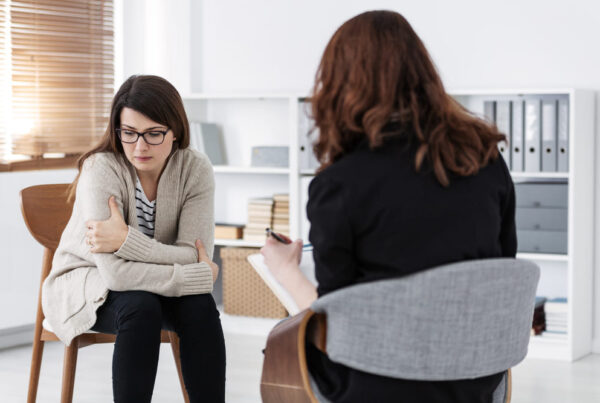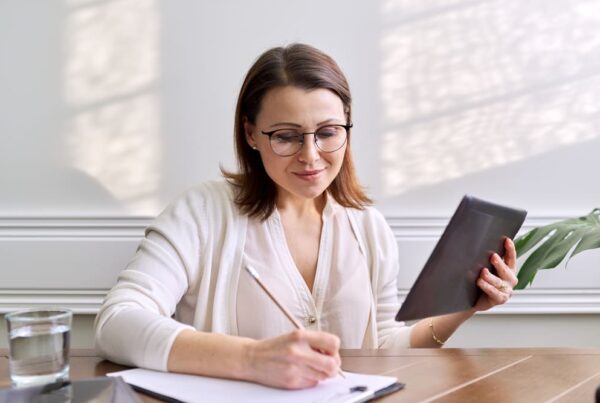Anxiety, worry, and stress can be debilitating challenges, especially given the current COVID-19 health crisis. Our modern society seems to be changing at an ever-increasing pace, and many of us have been affected by anxiety or know someone who has. Fortunately, mindfulness and meditation have a strong track record of helping to curb the effects of anxiety and worry by allowing us to get out of our own overwhelming thoughts and into a state of calm. We recently interviewed Your Local Psychiatrist NYC providers, Dr. James Colasurdo, PsyD, to learn about the role of mindfulness and meditation in addressing stress and anxiety.

Question: Please tell us a bit about your work at Your Local Psychiatrist NYC.
Dr. Colasurdo: I practice clinical psychology, so I’m a psychotherapist who offers counseling for people living with a wide range of challenges such as anxiety, depression, and grief and loss.
Question: Why do we hear so much about mindfulness and meditation in relation to stress and anxiety?
Dr. Colasurdo: You know, oftentimes, we’re our own worst enemy when it comes to anxiety and worry. While a reasonable amount of anxiety can be helpful, we often tend to overthink things, which really isn’t productive. Our modern society doesn’t do us any favors, either. COVID-19 presents a classic anxiety: a global pandemic about which we can do very little but isolate ourselves. What can we do? Relax, and learn how to control our aberrant mind. Mindfulness and support is the way. Anxiety is increasing in general, and traditional psychotherapy and medication therapy are not the only way to address these issues. Mindfulness and meditation offer an alternative approach.
Question: Why do you think we’ve seen, and continue to see, an increase in anxiety in our culture?
Dr. Colasurdo: There are many reasons. I see increased anxiety in my patients due to COVID-19. The uncertainty and lack of control are weighing heavily and ominously. In addition, in our society we see things like the internet and social media creating great disparities between people’s real lives and how we may perceive them. We look at people’s online profiles and the photos and videos they post and compare ourselves to them, which can cause anxiety. Our current political atmosphere can lead people to feel anxious. People’s societal roles are changing, and they don’t know what to expect, who they should be, what their legacies may be. Life, in general, is getting to be much more complicated.
Question: Tell us a bit about the idea behind mindfulness.
Dr. Colasurdo: Many of our readers may have read the book The Power of Now by Eckhart Tolle. There are two key concepts in the book that resonate for me. The first concept is the idea that there’s no past or future, only the present. The challenge is that very few of us actually live in the present. Instead, we live in thoughts of a past that we can’t change or a future that’s uncertain. We can certainly address our past, but we can’t change it. And we may have some idea of what the future looks like, but we can’t predict it with certainty. So, the key to reducing anxiety is to live in the present, the here and now.
The second idea is that you are not your brain. We tend to overthink things, over-analyze them, and these thoughts can lead to anxiety. While we need a bit of anxiety to keep us safe, many people experience far too much of it, which can truly impact their lives in all sorts of unpleasant ways. Historically, psychotherapy was used to address these issues. However, psychotherapy often asks us to look to the past to explain our patterns of thinking. And while we can explore our past, we simply can’t do anything to change it. Cognitive behavior therapy helps us to examine our patterns of thinking and behavior so we can change them in order to manage stress and anxiety. Journaling can also be helpful. So can mindfulness.
Question: What exactly is mindfulness?
Dr. Colasurdo: Mindfulness is a process in which we allow our negative or anxious thoughts to happen, and we simply experience them without judgement. It’s often combined with meditation to help us focus on the present, so we don’t get drawn into those patterns of thinking about the past or the future. It takes time and practice to master, but it works. Many people who practice mindfulness and meditation find that they become less bothered by things that once caused them anxiety and worry.
Question: How does mindfulness fit into the overall therapy landscape?
Dr. Colasurdo: As the engine and energy and ultimate additive to the cure in therapy…the positive relationship between the client and therapist.
Question: What could someone expect if you were guiding them through a mindfulness exercise during a therapy session?
Dr. Colasurdo: First of all, it’s important to understand that we will not be focusing on mental health diagnoses. This is not a clinical or medical approach to addressing mental health and anxiety. Instead, I would hope to help the person understand anxiety and why they might be experiencing it. I’d guide them through some mindfulness and meditation exercises so they have a chance to learn about these techniques and maybe even feel a bit better right then. For example, self talk, in which we talk to ourselves, is an effective way to mitigate over-thinking. And bibliotherapy, in which certain mindfulness readings are discussed and shared. Hopefully, I’d be able to provide them with a tool kit they can begin using right away to help calm themselves and get some clarity. Then, we would have some discussion about the process, whether or not it was beneficial, and how to utilize it on an ongoing basis.
Question: What about those mindfulness apps we see advertised online…are they beneficial?
Dr. Colasurdo: I find Headspace and Calm to be effective with my patients. Some speak of the benefits of 10% Happier, too. The apps can help anyone if used the right way.
Question: Who can benefit from practicing mindfulness?
Dr. Colasurdo: Anyone who’s struggling with pervasive anxiety, worry, unhappiness, or indecision. It could also be helpful for people who feel a bit of lack of belief in the system they’re in at present. For example, maybe they’re experiencing anxiety due to struggles with their roles at work, at home, or in society or they are struggling with their careers in the wake of COVID-19 and fear they cannot survive and thrive. Unfortunately there are far too many examples of increased anxiety in today’s world.
Want to Learn More?
If you are struggling with stress, anxiety, or worry and would like to request an appointment with Dr. Colasurdo or one of our other therapists, please call us today.
Crisis Information
Your Local Psychiatrist does not provide crisis services and is not staffed to respond to people in crisis. If you or someone you love are in crisis, below are some resources that may be helpful.
- If you are in danger or are having a health- or mental health-related emergency, please call 911 or go to the nearest emergency room.
- If you are experiencing a crisis, text HOME to 741741 from anywhere in the U.S. to reach a trained crisis counselor with the Crisis Text Line.
- If you or someone you love are contemplating suicide, please call the National Suicide Prevention Lifeline at 1-800-273-TALK (8255), En Español 1-888-628-9454, for support.



